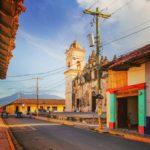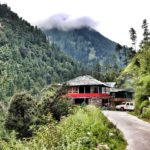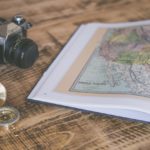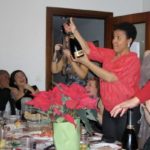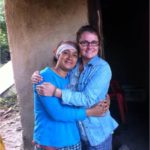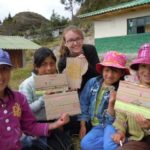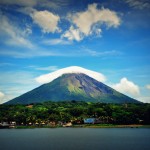Photographing Nicaraguan Culture with a Beating Camera
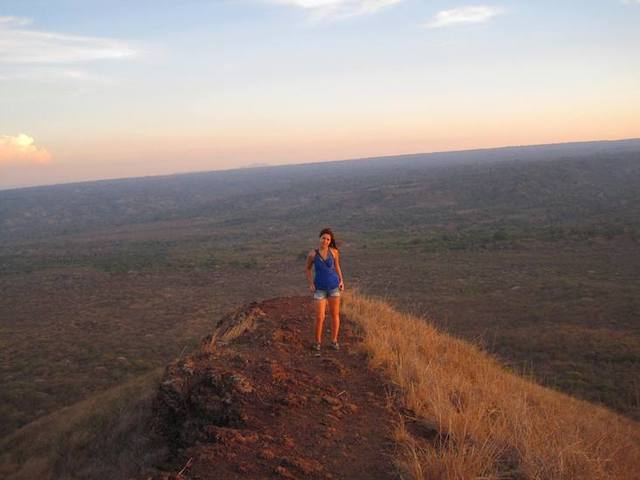
After an exhausting day spent on crowded buses, standing in lines with a killing heat and sweating like you just got out of a Bikram yoga class, we made it to the Nicaraguan capital of Granada coming from the coastal town of San Juan del Sur.
There were six of us. Five girls and one guy. It was past noon when we went out on a restaurant-hunting adventure only to feel completely disappointed after five minutes. Welcome to Granada. Everything was closed.
Hello! Of course everything was closed, or almost everything. It was Semana Santa (Holy Week), an important holiday for a highly religious, developing country. We kept walking, asking the locals about anything that could be open, but we had no success. We ended up in the central park taking pictures and acting like every other tourist that visits the city.
Due to our frustration, we had a complain-all-you-can moment. We all remembered how we bought groceries for little cost in San Juan del Sur, where we had stayed the previous two nights.
Little did we know this park meant salvation for us. There was a food stand with some dishes that didn’t sound too weird or scary for us to try. We ordered chicken, Cesar salads, and burgers. When the waiter gave us our food, we started eating quickly. At this point we were sick from eating too many crackers, granola bars and whatnot for the last three hours just to avoid that emptiness you get when you’re hungry.
My friends who ordered a burger and immediately noticed how raw the meat was. I thought they were exaggerating, but being completely honest, my chicken was not good either. None of us finished more than half of our plates. We just sat there instead talking and finishing our sodas, the only thing we actually liked.
Due to our frustration, we had a complain-all-you-can moment. We all remembered how we bought groceries for little cost in San Juan del Sur, where we had stayed the previous two nights. There, we ate well-served meals, whatever was left we could always cook it in the hostel.
Oh, how we missed those days in San Juan del Sur! Maybe Granada was going to be the same in the days to come. Maybe we could go back to spending nothing on groceries. Maybe we could go back to eating like kings, we thought.
Not after minutes earlier, I had complained about the same food the woman wanted and appreciated having.
Ah! We all signed. There was complete silence as a woman approached me from my right-hand side. “Te vas a comer eso?” (Are you finishing that?) She asked. I turn to her shocked trying to make sure I heard the right thing. She looked at me desperately looking for an answer and asked again, “are you eating what’s left over? I was hoping I could get it so that my baby and I could eat. We are hungry, very hungry,” she continued saying in Spanish.
She was holding her son in her scarred arms. Her face hadn’t escaped the flames either. I wondered what had happened. Signs of burns were all over her body. I could only imagined the suffering, the brutal pain, all the tears shed. I could not stop thinking about the struggle she was going through, living day-to-day, receiving someone else’s trash, someone else’s leftovers, something that people like us took for granted. To her, those weren’t leftovers; they were hope, the fuel to keep going, survival for her son, defeating adversity once again for a couple of hours.
All these thoughts in a matter of seconds, but the moment seemed eternal to me. I suddenly saw everything in slow motion. The leaves from the trees were falling as if they were cautiously watching this scene. The street dogs were no longer barking, no noise, nothing. I was fighting with myself. Fighting hard enough not to cry. I didn’t have the right to cry. Not after minutes earlier, I had complained about the same food the woman wanted and appreciated having.
All six of us stared at each other. A deadly silence this time. We took all of the food, put it in one plate and gave it to the lady.
Words were mad at me. They wouldn’t come out. My lips could not move fast enough to speak. I had an invisible sword going though my throat and it prevented me from producing sounds. My vocal cords hated me. Even the wind hated me and all six of us hated each other for a moment.
We talked about starvation when we had no idea what it was, what it meant or what it looked like. No, we didn’t need to go to the other side of the world. Starvation was right there, next to us, waiting for us to stop complaining, giving us a chance to be grateful.
I had said enough before, I had taken for granted food that was a treasure to a homeless Nicaraguan woman. All six of us stared at each other. A deadly silence this time. We took all of the food, put it in one plate and gave it to the lady. “Muchas gracias!” (Thank you so much) she said, walked away and sat in the park. She ate ferociously with her hands and fed her child. How many hours or days had she survived without eating? We would have to live with that mystery. Perhaps we didn’t want to know. Nobody had the courage to ask. Maybe we didn’t want to interrupt the lady’s temporary happiness.
As we walked by the lady when we were leaving, she stared at us endlessly, thanking us with a look. An unforgettable look. Shame on us. How could we forget that face? That expression that struck us? How could we forget that life lesson we had just gotten? How could we not feel depressed and miserable for what had happened?
When feeling frustrated while being abroad, think again. It could be worse.
When I first arrived to Nicaragua, my first reaction was to photograph everything so I could share my unforgettable experience with my Costa Rican host family. I was an exchange student in Heredia, a city located about 40 minutes away from Costa Rica’s capital, San Jose. After this trip to Granada, I realized that the most effective camera was my heart. Technology lacks the features to capture the real essence of other cultures. My heart photographed people and their souls through the colors of emotions, through the secrets of their eyes, through their untold stories.
Its been more than a year and a half of this day and I still remember it. It changed me. It scarred me forever, as deep as those woman’s burn scars. It scarred me for good. Being grateful while living abroad, particularly in a third world country and especially when reality falls short of your expectations, is a must.
When feeling frustrated while being abroad, think again. It could be worse. Someone else somewhere in the world, maybe right by your side, has an untold story. Take a picture and save it forever. Take a picture, but use your heart.


